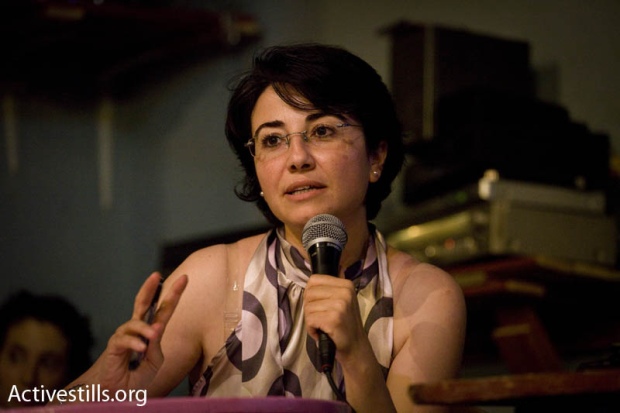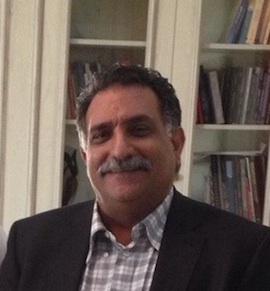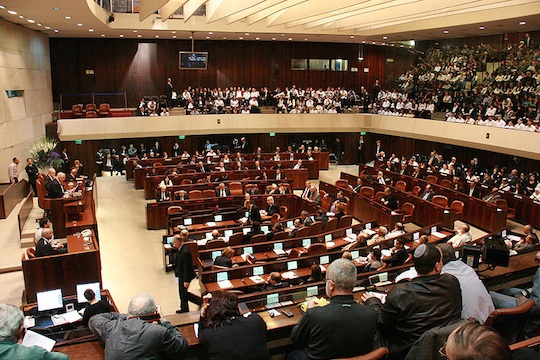When establishing the Knesset’s Palestinian democratic party, the founders of Balad had to shift their discourse and terminology: from the liberation of Palestine and the establishment of one inclusive democratic state, to the reinvention of Israel as a democratic state, the party’s secretary general writes. But has such a shift paid off?
By Awad Abdelfattah
On the eve of the 2009 Knesset elections, as I stepped off a platform following a political debate, an Israeli journalist approached me. “Is it true that you don’t vote,” she asked, “even though you are secretary general of a party that takes part in elections?”
I smiled. She was wrong – or rather her information was out of date. But at least she alluded to something that few Israeli Jews are aware of. For a Palestinian democrat and nationalist, participating in the Israeli Knesset is an agonizing compromise with one’s principles. I have never envied the Arab Knesset members from my own party, Balad, who are trying to promote a democratic and humanist vision for those who live in Palestine/Israel.
All of this has been underscored to me in recent days by the vilification of one of our legislators, Haneen Zoabi, since three Israeli teenagers went missing on June 12. She has been misquoted, her comments misrepresented and her real arguments ignored. As a result, she faces death threats and widespread incitement from Jewish legislators and the Israeli media.
Abandoning Communism, seeking a new paradigm
Before we established our party in the mid-1990s, most of the founders of Balad – or the National Democratic Assembly, as it is known in English – had to undergo a long and traumatic intellectual journey. The question before us was whether we could best effect change by engaging with the existing political system or by remaining outside it, focusing on our grass-roots activity.
I had been a member of the Marxist-nationalist movement of Abnaa al-Balad (Sons of the Village), which advocates a single democratic state in Palestine, and therefore always boycotts Knesset elections. The movement’s literature argues that the Israeli Knesset is at the apex of a system that legislated the colonization of our land and people. Involvement with this institution meant making a most fundamental political compromise.
This argument was bolstered for many political activists like myself by the experiences of Israel’s Arab-dominated Communist party. Through the fifties, sixties and seventies, when independent Arab parties were banned, Arab citizens who sought an outlet for their political activity supported the Communist party. For this reason, the party played an important role in the lives of Arab citizens during that period.
But despite its Arab-Jewish character and its recognition of Israel as the embodiment of Jewish self-determination, the party had failed over several decades to effect any meaningful change towards equality or make any ideological inroads in Israeli Jewish society.
Slowly many Palestinians in Israel began to realize that it was time to move beyond the Communist party’s approach. The slogan of equality, which has been the party’s ideological foundation, was exhausted. In recent decades, a new political awareness was emerging and needed a new political party – Balad – to articulate it.
Balad argued that efforts to integrate into Israeli society in the name of equality could never overcome the main ideological obstacle to equality: the Zionist-Jewish character of the state. The simple demand for equality was not only futile, but positively destructive. The newly emerging Palestinian elite concluded that by continuing to campaign for an undefined form of equality Palestinian citizens would obtain no real equality, in either national or civil rights. Instead they would simply damage the collective identity of the Palestinian minority in Israel.
New political thinking
This conclusion drew on the unique experiences of Palestinians in Israel. They had survived physically and culturally, but still faced an array of contradictions in the Israeli reality. These difficulties came to a head with the Oslo accords, which totally ignored and excluded the Palestinian minority from the proposed solution. The minority had to face the future on their own, in the context both of their Israeli citizenship and of the broader Palestinian cause.
By the 1990s large segments of the minority were already taking their citizenship more seriously, demanding true equality and not the degraded option of “integration.” The Communist party, which had formed and shaped the political discourse of the Palestinian minority for many years, was no longer capable of taking on this new challenge, and so its platform quickly became obsolete.
Around the time of the Oslo accords, the Palestinian minority faced many additional challenges: the collapse of the wider Palestinian national movement; the crumbling of the Soviet bloc and with it the loss of influence of the Communist party; and the breakdown of what was left of the regional Arab political system following the invasion of Kuwait in 1991 and the subsequent American war on Iraq. New political thinking was needed.
In the aftermath of Oslo, which the Communist party supported, many Palestinian activists and intellectuals were haunted by fears that large numbers of Palestinians would adopt defeatist positions. We worried that the youth, politically inexperienced and losing hope, would consider forgoing their national identity on the mistaken assumption that by joining Zionist parties and enlisting in the Israeli army they could win themselves equal rights. The urgent task was to create a new political and ideological platform that would prevent them from losing their way and becoming easy prey for the mainstream Zionist parties, the same parties that had been leading the systematic assault on our lands and destroying our cultural heritage and history through control of the school curriculum.
Sitting alongside those who have, and continue to kill our people
A new platform, requiring both full citizenship and a national identity, emerged as the new party emerged. Its slogans were: a state for all its citizens, full equality, and cultural autonomy for the Palestinian minority.
It was not an easy transition for many of the party’s founders. We had to shift our discourse and terminology: from the liberation of Palestine, all of Palestine, and the establishment of one inclusive democratic state, to the reinvention of Israel as a democratic state. The leadership, coming from different political factions and cultures, exhausted more than three years in debate. We believed we could transform the destructive contradictions of being present in the Knesset into a constructive process. The goal was to reconstruct the Palestinian minority’s political awareness by using the Knesset podium to launch an ideological confrontation with the Zionist character of the state. Azmi Bishara, the former leader of the party who is now in exile, was the leading intellectual among us, and he was the one who paid the highest cost.
The biggest challenge was entering the Knesset, where the racist laws are drafted and where our legislators would have to sit alongside those who have killed many of our people, and some who continue to kill them and even boast of it.
Some of the founders, especially those who had split from the Communist party, had already overcome the ideological difficulties of being in the Knesset. But those from political movements which had a history of boycott, such as myself and my colleagues from Abnaa al-Balad, had to begin a long and painful journey.
On the one hand, we understood that we needed a platform to reach both the Israeli Jewish public and, more importantly, our own people, many of whom expected us to be there. On the other hand, we feared falling into the trap of the Communist party, even if we offered a very different platform: namely, challenging the Jewish character of the state.
At the end, a compromise was reached among the leadership: The party would stand for election to the Knesset with a bold and innovative platform, but each of us had the option of not standing for the Knesset list if we found it too difficult to contemplate.
Although I have held the post of the secretary general for many years, I have visited our legislators in the Knesset only twice. I detest its racist environment. For that reason, I have only admiration for my comrades – Jamal Zahalka, Haneen Zoabi and Basel Ghattas – who endure it. Even so, my avoidance of the Knesset has not saved me from almost constant surveillance over three decades, as well as persecution and harassment at the airport – and that despite the fact that we are a legal party.
If Israel’s extreme right and its so-called liberal Zionists think that we are happy to be in the Knesset, they are very wrong. We pay a price each day. It is a compromise we make for the sake of our people, and for the hope of publicizing and promoting our democratic and humanist vision for a common life in this conflict-ravaged land.
Coming full circle
Few people probably know that on the eve of the last two Knesset elections, the party’s political bureau engaged in serious debate about whether our party’s continuing participation in the Knesset was useful. This was both because of the Palestinian minority’s growing marginalization and because of the suspicion that by being in the Knesset we were propping up Israel’s self-image as a democratic country, at a time when its international isolation was growing.
This debate dates back to the time of the Balad party’s establishment, but it has been revived among the leadership given the relentless campaign of incitement and political persecution of the party’s leaders. The party has faced numerous attempts at disqualification too.
Azmi Bishara, the party’s former leader and member of Knesset, was forced into exile in 2007. In earlier years he had been subjected to frequent incitement campaigns and put on trial several times. Ami Ayalon, the former head of the Shin Bet, Israel’s domestic intelligence service, wrote in his memoirs in 2001 that Azmi Bishara should be tried for not recognizing the Jewish state, and his party banned.
The recent attacks on Haneen Zoabi cannot be explained simply by the extreme right’s growing power; they are characteristic too of the ideology of the Zionist tribe, whether of the left or right. For the tribe, the Zionist and colonial character of the state is sacred. It is the supremacist thinking of the colonialist who expects the colonized to behave according to the rules of hospitability he has set down. He is the host, the owner of the land, and we the Palestinians, even those of us who hold Israeli citizenship, are the guests.
Our job is to remind Israelis, from within the system, that it is we who are the hosts and they the colonizers. Because we keep offering them true equality, they come under constant moral pressure and respond with further hostility. Israelis need to see us either as passive, accepting of their ethnic supremacy, or as chauvinist and inhuman, thereby justifying to them their evermore brutal practices, including ethnic cleansing.
Because Zionism is an inherently racist ideology, one which does not seek to exist with the indigenous population but rather to ethnically cleanse and exclude us, it is in real trouble. As a result, all Palestinians continue to suffer under a brutal colonial and apartheid regime. The insane and reckless political behavior of the current government will only fuel the fire in Palestine, and help to further isolate this apartheid regime. Believers in justice here and abroad, whether Palestinian or Jew, Israeli or non-Israeli, still have much work to do to shorten the path toward peace and justice.
In Balad the debate about our platform has spread: not only do we discuss whether we should continue participating in the Knesset but also whether, given the contradictions inherent in a Zionist-Jewish state, we should continue to struggle for the country’s transformation into a true democracy. Many of us, myself included, now believe it is time to move beyond this thinking and accept it is outmoded. The campaign now should be for a single democratic state, offering peace and justice to all those living in historic Palestine.
Awad Abdelfattah is the secretary general of Balad, which holds three seats in the current Knesset.



